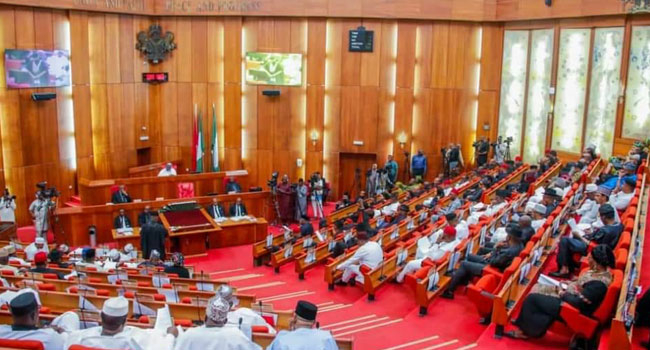- Senate expresses concerns about Customs Comptrollers in Kaduna, Katsina, and Ogun for neglecting firearm engagement rules
- Senate calls for investigations into unofficial receipts, recommends lifting a 20-kilometer petroleum product sale ban in border communities
The Senate has raised concerns regarding the conduct of Customs Comptrollers in Kaduna, Katsina, and Ogun (specifically the Idiroko area) states, accusing them of neglecting the rules of engagement concerning the use of firearms.
These allegations were brought to light in a report submitted by the Senate Adhoc Committee on the Abuse of Firearms by officials of the Nigeria Customs Service. The report was presented during a Senate plenary by Senator Francis Fadahunsi, the committee’s chairman.
The committee’s investigation focused on the alleged misuse of firearms by Customs officers stationed in border towns across the country.
The report, which the Senate adopted, suggests that both traders and non-traders were reportedly compelled to obtain unofficial receipts before being permitted to transport legitimate goods.
The disbanded Strike Force of the Federal Operation Unit was accused of firing at innocent citizens, raiding markets, and chasing smugglers into towns, leading to the loss of lives.
In response to these findings, the Senate has called for the Comptroller General of Customs to investigate the issuance of unofficial receipts at the borders.
The Senate also recommended that the Federal Government lift the 20-kilometer ban on selling petroleum products in border communities. This policy was criticized for its negative impact on peaceful coexistence, the people’s ability to integrate into the larger Nigerian society, and the hardship it imposed on these communities.
The Senate emphasized the importance of considering the historical bonds and relationships that exist between border communities when formulating policies. It also called for the redeployment of the Comptrollers of Katsina/Kaduna and Idiroko (Ogun State) Area commands and the appointment of replacements who can engage with the community effectively. This would help establish a positive relationship and enable Customs to fulfill its mandate while being sensitive to the needs and aspirations of the local communities.










Discussion about this post